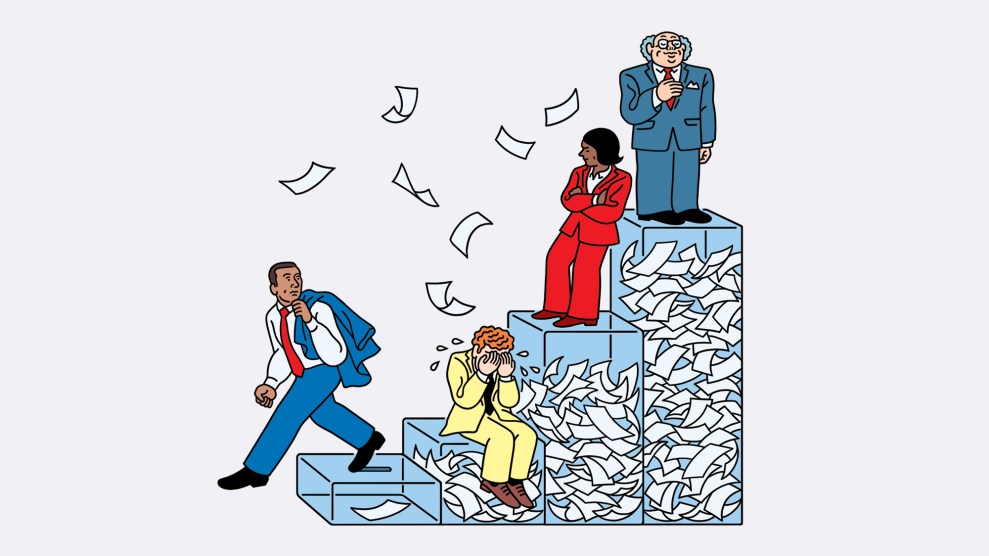Last week, a Texas jury recommended that Kenneth Payne, 29, spend 16 years in jail.
Payne’s crime? Stealing a Snickers bar from a Tyler, Texas grocery store on Dec. 17, 1999.
When Smith County Assistant District Attorney Jodi Brown was asked by the Associated Press how she could justify 16 years for the theft of a Snickers bar, Brown replied “It was a king size.”
A king-size Snickers bar it was. Retail price: $1.
In Texas, if you steal property worth less than $500, it’s a misdemeanor punishable by a fine of $500 with no jail time. The case was brought as a felony because Payne was a habitual offender. He had 10 previous convictions — including one for stealing a bag of Oreo cookies — and had spent seven years in Texas prisons. When he shoved the king-sized Snickers bar down his pants he was on parole for felony theft.
Still, the guy was a petty thief — he stole cookies and candy bars.
Compare Kenneth Payne’s plight to those of a group of white-collar and corporate criminals who also were sentenced this month.
Hoffman-LaRoche Ltd. pled guilty for their roles in an international conspiracy to suppress and eliminate competition in the vitamin industry — what the Justice Department calls perhaps the largest criminal antitrust conspiracy in history. The prison terms: four months, three and one-half months, three months and three months. (The four executives were also fined anywhere from $75,000 to $350,000).
Also this month, three cruise line employees were sentenced for their role in dumping pollution into the Alaskan Inland Passage from a Holland America cruise ship. The three employees were each sentenced to two years unsupervised probation and fined $10,000.
These are not unusual sentences for white-collar criminals. In fact, it is unusual to see a white-collar criminal do time.
So, how can it be that Kenneth Payne is doing 16 years for stealing a $1 candybar while the former executives of some of the world’s largest corporations get off with a few months in prison — after being convicted of a crime that cost consumers hundreds of millions of dollars?
It’s like Richard Pryor said: In our country, justice means “just us” regular folks and not “them,” the people who call the shots, who end up in the slammer.
This double standard permeates every aspect of our criminal justice system.
The other day, for example, we were listening to National Public Radio, and up popped a debate about whether felons should be allowed to participate in a democracy.
On one side of the debate was Mark Mauer of the Sentencing Project. Mauer pointed out that in 46 states, you can’t vote if you are in prison. In 16 states, if you were convicted of a felony — even if you get out of prison — you are disenfranchised for life. Mauer estimated that 13 percent of adult black men cannot vote as a result of a felony conviction right now.
On the NPR show, Roger Clegg, an attorney with the right-leaning Center for Equal Opportunity (Linda Chavez’ think tank), made the argument that felons shouldn’t be allowed to vote. “If you aren’t willing to play by the rules, then you shouldn’t have a say in making the rules,” Clegg said. “And people who have been convicted of felonies, which are by definition serious crimes, shouldn’t be given a role in deciding how the government should be run.”
After hearing this, we called up Clegg to ask what he thought about banning corporate criminals — like BASF and Hoffman-LaRoche, who had engaged in perhaps the most egregious criminal antitrust conspiracy in history — from “deciding how the government should be run.” (Corporations of course don’t vote, but they do give money to elect candidates, they lobby legislators and law enforcement officials, and they mold public opinion through their public relations efforts.)
Gone was Clegg’s unwavering absolutism.
After much humming and hawing, Clegg admitted that “it makes sense to limit the political role of corporations when they have shown that they are not worthy of trust.” But he quickly added that “because individuals and corporations are fundamentally different, you can’t just apply the rules equally.” Clegg questioned whether the First Amendment would allow prosecutors to strip corporations of their “rights” to influence how the government should be run. Clegg, of course, raised no such question when it came to stripping individual felons of such “rights.”
What about the death penalty? In a new book, “Actual Innocence: Five Days to Execution and Other Dispatches from the Wrongly Convicted” (Doubleday, 2000), Jim Dwyer, Peter Neufeld, and Barry Scheck report that in the 24 years since the death penalty was reinstated by the Supreme Court, about 620 individuals have been put to death, and 87 condemned persons were exonerated and their sentences commuted or lifted.
Given those numbers, innocent people almost surely have been executed. All this while enormous and recidivist corporate criminals like Exxon, Royal Caribbean, Rockwell International, Warner Lambert, Teledyne, and United Technologies — criminals truly deserving of the corporate death penalty, get away with slap-on-the-wrist fines.















